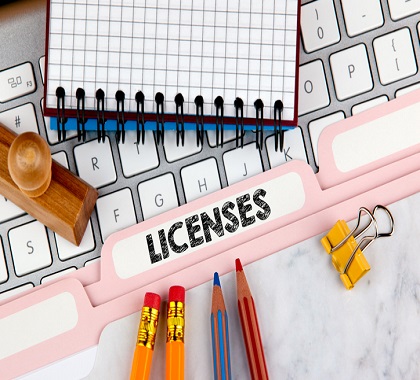Burdensome licensing laws often produce wide-ranging negative economic effects, including a decrease in business competition and increases in basic service costs. In many instances, these laws are unnecessary because government involvement often does not guarantee better or safer services. Currently, Missouri ranks among the top tier of states that limit burdensome licensing standards. The Show Me State requires licenses for only 31 of the 102 occupations documented in a report by the Institute for Justice (IJ).
Despite the fact Missouri mandates few professional licenses, several of its state policies should be reformed that would greatly improve the state’s economy. IJ found one-third of the occupations licensed in Missouri were licensed by fewer than half the other states, suggesting Missouri has much room for improvement.
IJ found the cost burden of licensing for low- and moderate-income occupations typically amounts to $100 in fees, 220 work days lost to education and experience, and one exam. These economic barriers harm all Show Me State residents by decreasing job opportunities and increasing the prices of goods and services.
Eliminating excessive licensing requirements and permitting voluntary certification are viable options that would empower consumers to choose the best services on their own, thereby allowing the free market to flourish. Draconian occupational regulations such as registration, certification permits, and licensure give bureaucrats undue influence on dozens of industries. This creates an economic environment that’s rife with cronyism and exceedingly difficult for new and existing businesses to operate or expand.
Fortunately, Missouri lawmakers are considering a proposal that would blunt the threat posed by overregulation. The bill would empower individuals with the abilities to oppose occupational regulations or challenge them in court. The Occupational Regulation Defense Act (ORDA) would also provide significant protections for individuals against unwarranted occupational regulations in any administrative or judicial proceeding.
ORDA would make the burden of proof in legal proceedings opposing a rule or regulation “clear and convincing evidence.” Under this standard, an individual appealing a rule would have to show the regulation substantially burdens a person’s right to pursue a lawful occupation. To combat the appeal, the government must prove that the rule or regulation is “substantially related to and the least restrictive means for furthering that important governmental interest.” This would place the onus on the government to prove the regulation is needed.
The Right to Earn a Living Act (RELA), a model bill written by the Goldwater Institute, is another policy option Missouri should consider. RELA would explicitly require all licensing rules or ordinances to “be limited to those demonstrably necessary and carefully tailored to fulfill legitimate public health, safety, or welfare objectives.” Similar to ORDA, RELA would put “the burden of proof back where it belongs—on the regulators who restrict economic freedom, instead of the job-seeker,” argued John Riches, the Goldwater Institute’s director of national litigation.
To improve prosperity for all of Missouri’s citizens, the Show-Me State must maximize opportunities for businesses and citizens and reject unnecessary regulatory hurdles. Removing onerous occupational licensing laws that create barriers to entry and stifle innovation would be a good first step toward achieving this goal.
The following documents examine occupational licensing in greater detail.
Occupational Licensing in Missouri
https://showmeinstitute.org/sites/default/files/20140226%20-%20Stokes%20-%20Occupational%20Licensing%20in%20Missouri_0.pdf
In his testimony before the Missouri House Professional Registration And Licensing Committee, David Stokes of the Show-Me Institute discusses Missouri’s occupational licensing regime, highlighting the aspects of the regulatory system that work and those that require reform. “Fewer occupational licenses mean more opportunity for employment, lower professional entry costs, more competition, and greater choice for consumers. In this distressed economic climate, it is more important than ever to encourage entrepreneurship and remove regulatory barriers to work,” Stokes wrote.
Restoring the Right to Earn a Living: A Common-Sense Solution to Occupational Licensing Job Barriers
https://pelicaninstitute.org/restoring-the-right-to-earn-a-living/
Goldwater Institute Director of National Litigation Jon Riches examines the burdens inflicted by onerous job licensing requirements in Louisiana. “For too many professions, occupational licensing requirements do not exist to protect public health and safety—rather, they exist to protect incumbent industries or special interests,” Riches wrote. “The percentage of jobs requiring a license has exploded over the last 60 years, and in a state like Louisiana, which has slow job growth and low wages, thousands of job-seekers are being unnecessarily blocked from meaningful work.”
How Louisiana’s Occupational Licensing Requirements Reduce Opportunity and Prosperity
https://pelicaninstitute.org/how-louisianas-occupational-licensing-requirements-reduce-opportunity-and-prosperity/
This article from the Pelican Institute examines Louisiana’s occupational licensing regime and how it impacts jobs in the state.
Bottleneckers Beware: Occupational Licensing Reform Bills Filed Across the Nation
http://ij.org/bottleneckers-beware-occupational-licensing-reform-bills-filed-across-nation/
Matt Powers of the Institute for Justice examines the growing trend in states to reduce burdensome occupational licensing laws, which impede dozens of industries nationwide.
Right to Earn a Living Act
https://goldwaterinstitute.org/article/right-to-earn-a-living-act/
The Goldwater Institute argues the burdens of occupational licensing in many states are excessive and should not be placed on those who want to earn an honest living. Instead, governments should bear the burden of justifying the restrictions. The authors argue states should enact a Right to Earn a Living Act to protect freedom of enterprise. By doing so, they will ensure that economic opportunity is not merely a promise but a reality.
Occupational Licensing: Ranking the States and Exploring Alternatives
http://heartland.org/policy-documents/occupational-licensing-ranking-states-and-exploring-alternatives
Adam Summers of the Reason Foundation addresses the impact of occupational licensing on the labor market. Service quality and health and safety “may actually be diminished by occupational licensing,” he finds. Through high prices, reduced competition, and arbitrary requirements, the government thus hurts the average consumer and worker. Licensing is for special interests, not public interests, he writes. These laws hurt the poor and minorities disproportionately, he notes, proving the government is not helping those they say they are.
Occupational Licensing: Protecting the Public Interest or Protectionism?
http://heartland.org/policy-documents/occupational-licensingprotecting-public-interest-or-protectionism
Morris Kleiner reflects on the growth of the strictest form of occupational regulation: licensing. The result is potential job losses and an increase in prices, he finds. The costs of occupational licensing show the practice must be ended or changed, he says, and he proposes certification of occupations that does not limit entry and mobility and may prevent job losses.
The Prevalence and Effects of Occupational Licensing
http://heartland.org/policy-documents/prevalence-and-effects-occupational-licensing
Morris Kleiner and Alan Krueger note research shows nearly 30 percent of the U.S. workforce is required to obtain a license to work. The authors find licensing costs consumers more and reduces their ability to choose services for themselves.
License to Work: A National Study of Burdens from Occupational Licensing
http://heartland.org/policy-documents/license-work-national-study-burdens-occupational-licensing-1
The Institute for Justice conducted a national study to measure how burdensome occupational licensing laws are for low-income workers. The authors found “the barriers imposed by licensure schemes on those wishing to enter the 102 lower-income occupations we studied are not only widespread but often severe, arbitrary and irrational.” The authors conclude, “As millions of Americans struggle to find productive work, one of the quickest ways legislators can help is to simply get out of the way: Reduce or remove burdensome regulations that force job-seekers and would-be entrepreneurs to spend precious time and money earning a license instead of working.”
Nothing in this Research & Commentary is intended to influence the passage of legislation, and it does not necessarily represent the views of The Heartland Institute. For further information on this and other topics, visit the Budget & Tax News website, The Heartland Institute’s website, and PolicyBot, Heartland’s free online research database.
The Heartland Institute can send an expert to your state to testify or brief your caucus; host an event in your state, or send you further information on a topic. Please don’t hesitate to contact us if we can be of assistance! If you have any questions or comments, contact Lindsey Stroud, a government relations manager at The Heartland Institute, at [email protected] or 312/377-4000.




